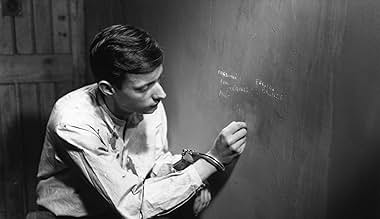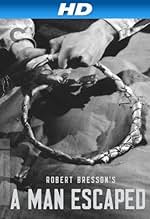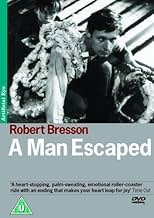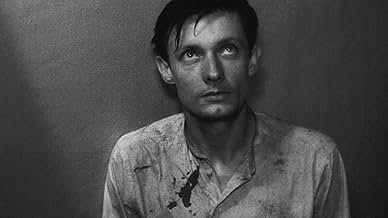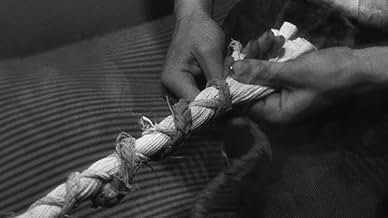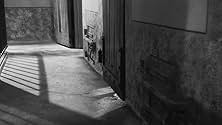Un condamné à mort s'est échappé ou Le vent souffle où il veut
- 1956
- Tous publics
- 1h 41min
NOTE IMDb
8,2/10
29 k
MA NOTE
Conduit en 1943 au fort de Montluc pour y être exécuté par les Allemands, le lieutenant Fontaine parvient à s'échapper en compagnie d'un autre prisonnier, Jost.Conduit en 1943 au fort de Montluc pour y être exécuté par les Allemands, le lieutenant Fontaine parvient à s'échapper en compagnie d'un autre prisonnier, Jost.Conduit en 1943 au fort de Montluc pour y être exécuté par les Allemands, le lieutenant Fontaine parvient à s'échapper en compagnie d'un autre prisonnier, Jost.
- Réalisation
- Scénario
- Casting principal
- Nomination aux 1 BAFTA Award
- 4 victoires et 3 nominations au total
César Gattegno
- Le prisonnier X
- (non crédité)
Max Schoendorff
- Un soldat allemand
- (non crédité)
Résumé
Reviewers say 'A Man Escaped' is lauded for its minimalist style and intense focus on escape from a Nazi prison. Bresson's direction, sparse dialogue, and use of non-professional actors are praised. The deliberate pacing builds suspense and immerses viewers. Some appreciate its authenticity, while others find it less engaging. Leterrien's performance is noted for realism, but opinions vary on its accessibility and emotional impact.
Avis à la une
Bresson's command of the cinematic language...and more importantly, his restraint... make this a very powerful story of one man's determination to find meaning in his actions, focused goal, and adherence to his beliefs.
Presumably tipping off the viewer with the title (A Man Escaped) we already suspect how it will end, and therefore the tension isn't in the final twists of the story, but rather, his journey to that place.
Narrative stripped down of all melodramatic trappings, the film manages to reveal a larger truth about man's struggle against unknowable odds, his struggle with himself, and his resolve to move forward. A couple of the side-characters are from the church, or pastors, which give the ongoing conversations in the common areas an added resonance to "grace" and a possibility of transcendental deliverance. Even though the lead character doesn't seem to truck much with religious faith.
He has his own - in his resolve to escape.
It's appropriate that we barely know why the lead character is in prison, only that he is already on the way there when the film starts. (And even then, tries a failed attempt to run from the car that is transporting him. So much for back-story. The character is revealed through his subsequent actions.)
A simple beautiful film focused on humanity at its most desperate, spare, and focused.
Presumably tipping off the viewer with the title (A Man Escaped) we already suspect how it will end, and therefore the tension isn't in the final twists of the story, but rather, his journey to that place.
Narrative stripped down of all melodramatic trappings, the film manages to reveal a larger truth about man's struggle against unknowable odds, his struggle with himself, and his resolve to move forward. A couple of the side-characters are from the church, or pastors, which give the ongoing conversations in the common areas an added resonance to "grace" and a possibility of transcendental deliverance. Even though the lead character doesn't seem to truck much with religious faith.
He has his own - in his resolve to escape.
It's appropriate that we barely know why the lead character is in prison, only that he is already on the way there when the film starts. (And even then, tries a failed attempt to run from the car that is transporting him. So much for back-story. The character is revealed through his subsequent actions.)
A simple beautiful film focused on humanity at its most desperate, spare, and focused.
Though the title seems to ruin the ending, the movie isn't boring for a moment. Suspense to the end. Marvelous filmmaking. The movie follows slowly and quietly the day of the prisoner who's to be executed and plans an escape. I don't know what else to say. You have to watch this. 32 of the 46 voters gave it a 10! Genius. They don't make movies like this often. Must See for movie lovers and all.
I hit an impasse with Bresson's previous film, Diary; he used a peculiar conflation of a search for transparent truth in the mysteries of life with anguish and dejection as romanticized spiritual journey, romanticized in the Christian sense where it's not spiritual if it doesn't have anguish. It seemed crude and without enlightenment.
The impasse was; was the pious young priest for Bresson another person among others in the village led astray in the effort to rationalize his emotions, or was he above them, an ideal to aspire to? This was more interesting to me than the film itself.
So I came to this hoping for the fresh light of retrospect. And what a stark contrast this is! Another idealistic young man who suffers torments, physical and inner, another life of anguish in four walls. But here Bresson draws the breath in, quiets the anguish, accepts the fact of it, and works to concentrate the senses and create physical presence. We've come far in our ability to do this, but it still resonates.
The film is practically a long suspense piece, with a few questions about ethics suspended briefly. The man here, by contrast to the priest, simply does the work he sets out before him. He doesn't perceive himself a martyr of his cause, or a quiet sufferer of wrongs, he simply abides and prepares for the long night. His idealism waits to be found out until near the end when the charges against him are laid out; sabotage.
It's fine work, easy to parse. It doesn't answer the impasse mentioned above so for that I'll have to go to his next one.
The impasse was; was the pious young priest for Bresson another person among others in the village led astray in the effort to rationalize his emotions, or was he above them, an ideal to aspire to? This was more interesting to me than the film itself.
So I came to this hoping for the fresh light of retrospect. And what a stark contrast this is! Another idealistic young man who suffers torments, physical and inner, another life of anguish in four walls. But here Bresson draws the breath in, quiets the anguish, accepts the fact of it, and works to concentrate the senses and create physical presence. We've come far in our ability to do this, but it still resonates.
The film is practically a long suspense piece, with a few questions about ethics suspended briefly. The man here, by contrast to the priest, simply does the work he sets out before him. He doesn't perceive himself a martyr of his cause, or a quiet sufferer of wrongs, he simply abides and prepares for the long night. His idealism waits to be found out until near the end when the charges against him are laid out; sabotage.
It's fine work, easy to parse. It doesn't answer the impasse mentioned above so for that I'll have to go to his next one.
10niezone
What makes a movie great? Sometimes we find it in an actor's performance, sometimes it lies in the plot, maybe is the suspense, or amazing action scenes. "A Man Escaped", a movie by acclaimed director Robert Bresson delivers none of those elements we usually associate with great films. However, the expertise and craftsmanship of Bresson makes for an unparalleled experience, full of non-stop suspense that keeps you at the edge of your seat, captivated by every action and every move. In fact, this is one of the first times in recent memory when I don't end up checking my watch, or looking around, or even exchanging a couple of words with my company. "A Man Escaped" simply doesn't allow you to catch your breath. Bresson is known for his very distinct style, in which his interest goes beyond performances or strong plots, but rather relies on the character of his scenes, in the way he builds each and every take to make you build the environment for yourself. Bresson is the mastermind behind the term "suggestive" cinema. He shows you just enough for you to build the scene on your own and it is such a subtle directing skill, that you don't realize unless you carefully study the art of his direction. Bresson submerges us in a prisoner's routine, inside a process of patience and conviction that eventually pays off. Bresson goes as far as to show us the result of the movie in its very title, fully confident that even when you know what will happen at the end, there is no way you won't feel the increasing tension, and electrifying suspense that starts from the very first scenes. At the end, it is a movie about patience, about the intellect of a prisoner whose will and desire to escape a prison portrays the strengths of the human spirit. However, the movie does not have uplifting phrases that often fall into clichés. This, ladies and gentleman, is what cinema can do for us. Less is more.
Pages and pages of film criticism could be, and most likely have been, written about this film, so I will just include my simple wholehearted recommendation, in the hopes that whoever is reading this will seek out "A Man Escaped" immediately. I can think of few films with a simpler premise and plot line - it really is only about an anonymous man in prison attempting to escape. That's it. Yet, director Robert Bresson, more than any other director I can think of (with the exception of Yasujiro Ozu), can imbue the drab everyday details of life with life-and-death importance. This director could make a movie about a guy tying his shoes into a riveting cinematic experience. His style of film-making is completely unobtrusive and restrained, because he has figured out a simple truth that about 95% of all film directors never realize: the less a director tries to "push" his ideas through a film, ironically, the greater the range of ideas he is able to elicit in his audience. You bring to this movie whatever life experience and ideas you carry with you; an older child as well as an aging philosophy professor can enjoy this film equally, and for very different reasons. In addition, I believe this is also the most realistic film that I have ever seen. It takes the skill of a master to make reality into great cinema, and this film is one of Bresson's greatest. It could even be his greatest, because though his other films "Au Hasard Balthazar" and "Pickpocket" are great masterpieces, they can never have the same kind of accessibility to virtually any living person in the world as this has.
Le saviez-vous
- AnecdotesAfter seeing the film, Jean-Luc Godard said that Robert Bresson was "to French cinema what Wolfgang Amadeus Mozart is to German music and Fyodor Dostoevsky is to Russian literature".
- Citations
Le lieutenant Fontaine: I think my courage abandoned me for a moment and I cried.
- Versions alternativesAfter the "Fin" title card, there is a version that plays music to a black screen, while another version displays "Exit Music" in white letters against the black screen.
- ConnexionsFeatured in De weg naar Bresson (1984)
- Bandes originalesGreat Mass in C Minor, No.16 (K.427) - Kyrie
Written by Wolfgang Amadeus Mozart
Meilleurs choix
Connectez-vous pour évaluer et suivre la liste de favoris afin de recevoir des recommandations personnalisées
- How long is A Man Escaped?Alimenté par Alexa
Détails
- Date de sortie
- Pays d’origine
- Langues
- Aussi connu sous le nom de
- Le vent souffle où il veut
- Lieux de tournage
- Sociétés de production
- Voir plus de crédits d'entreprise sur IMDbPro
- Durée1 heure 41 minutes
- Couleur
- Rapport de forme
- 1.37 : 1
Contribuer à cette page
Suggérer une modification ou ajouter du contenu manquant

Lacune principale
What is the Japanese language plot outline for Un condamné à mort s'est échappé ou Le vent souffle où il veut (1956)?
Répondre

